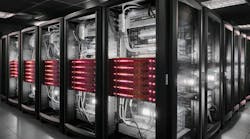DataBank Acquires Property near Denver for Data Center Expansion
DataBank continues to rapidly expand its national network of data centers, adding capacity in key growth markets. The colocation and edge computing specialist said today that it has purchased an existing facility at 6961 S. Quentin Street in Centennial, Colorado, which will become DataBank’s 5th Denver data center.
The property includes an existing 108,000-square-foot light-industrial facility that can be rapidly retrofitted for data center use, yielding 75,000 square feet of raised floor space and 15 megawatts of UPS power designed to support enterprise, hyperscale and high-performance computing (HPC) workloads. The initial DEN5 build will feature one data hall of 30,000 raised square footage and 6MW of power, with expansion capacity of two additional data halls.
The new DEN5 facility is adjacent to DataBank’s existing DEN2 data center, which has been in place since 2011, creating a campus environment that allows customers to easily expand their IT infrastructure. Denver is a strong growth market for start-ups and venture capital in the tech industry.
“The investment in this new campus responds to Denver’s need for colocation, connectivity, and cloud services, solidifying its status as a prime location for enterprise-class data centers,” comments Raul Martynek, DataBank’s CEO. “With this acquisition, DataBank will bring to the Denver market both high-value IT operations jobs and the reliable IT infrastructure our customers need to create a limitless digital future for their business.”
Denver is a prime example of a “second tier” digital hub driven by demand from local businesses with growing requirements for data center space. The Mile High City has one of the fastest-growing technology ecosystems in the United States and is home to numerous colocation providers, carriers, technology companies, IT services providers, and regional/HQ in-house data centers.
Denver is also a major U.S. fiber hub, acting as a central relay point that connects West Coast backbones and end users to major Midwest and East Coast markets.
It’s Go-Time for DataBank
DataBank is a colocation provider operating in both primary and secondary data center markets. It is owned by Digital Bridge, a real estate firm with a vision for converged digital infrastructure, bringing together hyperscale, colocation, modular data centers, small cell networks and fiber to create a converged digital infrastructure.
This is the third expansion for DataBank in the past six weeks.
- Just two weeks ago, DataBank announced the expansion of its DFW3 data center in Plano, Texas in the heart of the Dallas Telecom Corridor, ringing an additional 12,000 square feet of raised flooring and an additional 1.5MW of power online.
- On June 16, DataBank said it add 25,000 square feet of raised floor space and 2.5MW of power to its PIT2 data center in Pittsburgh.
DataBank has been an active consolidator, buying C7 Data Centers (2017), Edge Hosting (2017), a data center portfolio from 365 Data Centers (2017), Lightbound (2017), and now zColo (2020) and a stake in EdgePresence (2020). This series of deals transformed DataBank from a regional specialist into one of the largest U.S. data center operators, with 64 data centers, 1.2 million square feet of data center space, and 138 megawatts of installed UPS capacity.
DataBank’s most recent expansions are supported by a recent fundraising of $658 million through the sale of secured notes, a strategy that allows companies to borrow funds at a lower rate using pools of assets and cash flow as collateral. Previous secured notes have been backed by wholesale data centers with long-term leases and marquee tech companies as tenants. The DataBank deal expands this strategy to multi-tenant data centers with enterprise tenants, who typically are governed by service agreements with shorter terms.
About the Author



